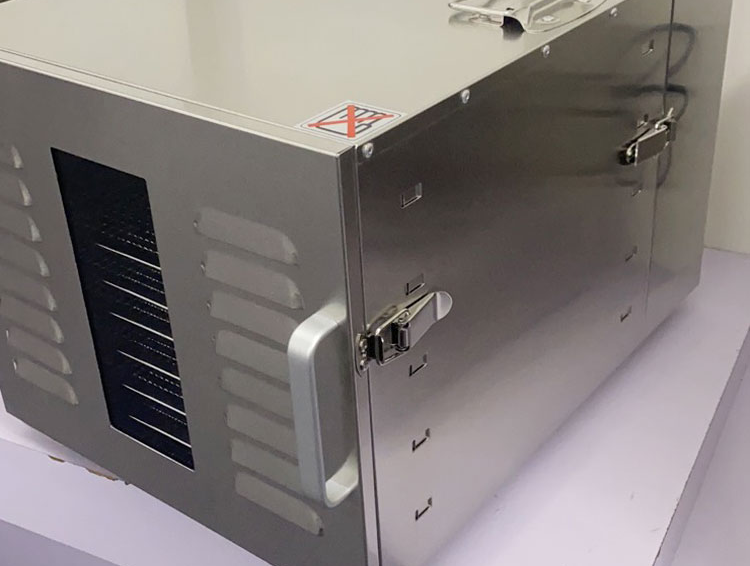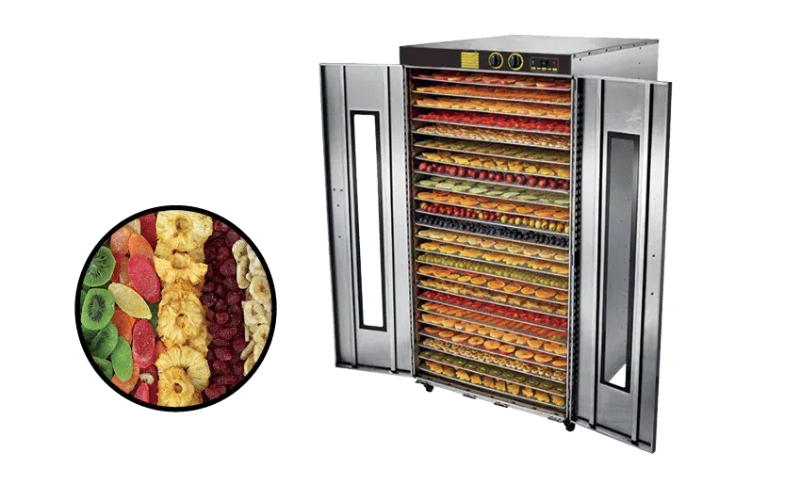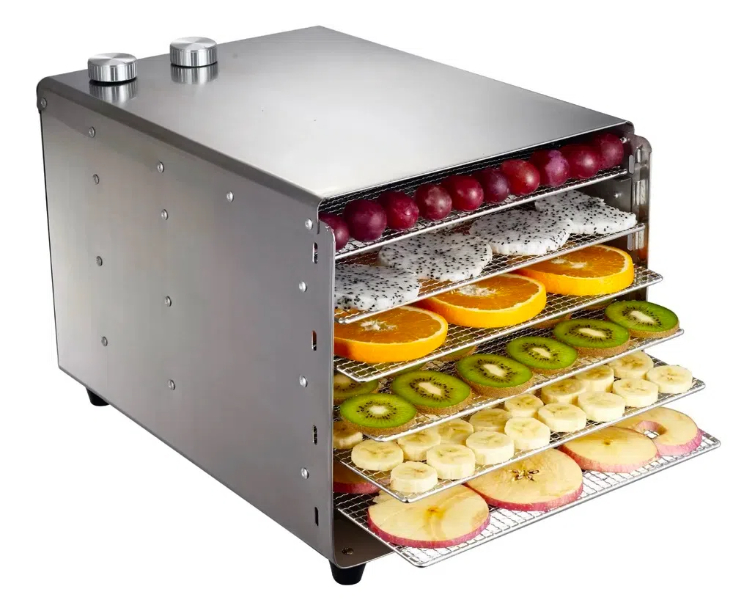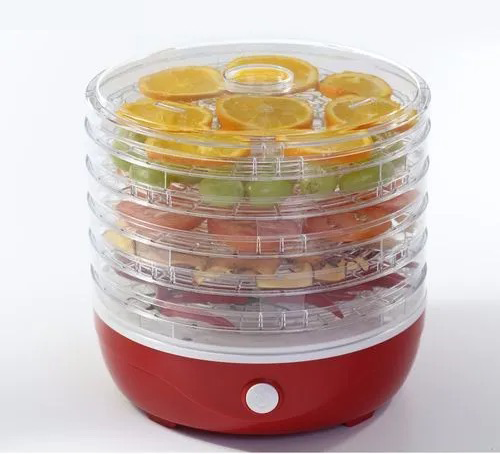
Content Menu
● Introduction to Fruit Dehydration in South Africa
● The Rise of Fruit Dehydrator Technology in South Africa
>> Benefits of Using Fruit Dryer Machines
● Types of Fruit Dryer Machines Available in South Africa
>> 1. Small-scale Fruit Dehydrators
>> 2. Commercial Fruit Dryer Machines
>> 3. Industrial Fruit Drying Technology
>> 4. Multi-purpose Food Dehydration Equipment
● Key Features to Look for in a Fruit Dryer Machine
>> 1. Capacity and Size
>> 2. Material and Build Quality
>> 3. Temperature Control
>> 4. Airflow System
>> 5. Energy Efficiency
● Popular Fruit Dryer Machine Brands in South Africa
● The Fruit Drying Process: From Fresh to Preserved
>> 1. Selection and Preparation
>> 2. Pretreatment
>> 3. Loading the Dryer
>> 4. Setting the Temperature
>> 5. Monitoring the Process
>> 6. Cooling and Storage
● Innovative Applications of Fruit Drying Technology in South Africa
>> 1. Gourmet Dried Fruit Products
>> 2. Sustainable Agriculture Initiatives
>> 3. Nutraceutical Production
>> 4. Eco-friendly Packaging Materials
● Maintenance and Care of Fruit Dryer Machines
● The Future of Fruit Drying Technology in South Africa
● Conclusion
● Frequently Asked Questions
>> 1. What are the best fruits to dry using a fruit dryer machine in South Africa?
>> 2. How long does it take to dry fruits in a typical fruit dehydrator?
>> 3. Are fruit dryer machines energy-efficient?
>> 4. Can I use a fruit dryer machine to make biltong?
>> 5. What is the average lifespan of a commercial fruit dryer machine?
Introduction to Fruit Dehydration in South Africa
South Africa, with its diverse climate and rich agricultural heritage, is a land of abundant fruit production. From the sun-kissed orchards of the Western Cape to the tropical plantations of Limpopo, the country is blessed with a wide variety of fruits throughout the year. However, the challenge lies in preserving this bountiful harvest, especially during peak seasons when supply often exceeds demand. This is where fruit dryer machines come into play, offering an efficient and effective solution for preserving fruits and vegetables while retaining their nutritional value and flavor.
The Rise of Fruit Dehydrator Technology in South Africa
In recent years, there has been a significant increase in the adoption of fruit dehydrator technology across South Africa. Both small-scale farmers and large commercial operations are recognizing the benefits of using advanced fruit dryer machines to extend the shelf life of their produce and create value-added products.
Benefits of Using Fruit Dryer Machines
1. Extended shelf life of fruits and vegetables
2. Preservation of nutritional content
3. Reduction of food waste
4. Creation of new product lines (e.g., dried fruit snacks)
5. Year-round availability of seasonal fruits
6. Increased profit margins for farmers and producers

Types of Fruit Dryer Machines Available in South Africa
The South African market offers a wide range of fruit dryer machines to cater to different needs and scales of operation. Let's explore some of the most popular types:
1. Small-scale Fruit Dehydrators
These compact units are perfect for home use or small businesses. They typically feature multiple trays and can handle small batches of fruits and vegetables. Many South African households are now investing in these devices to make their own dried fruit snacks and preserve garden produce.
2. Commercial Fruit Dryer Machines
Designed for larger operations, commercial fruit dryer machines offer higher capacity and more advanced features. These stainless steel fruit dehydrators are built to handle continuous operation and can process large quantities of fruits and vegetables efficiently.
3. Industrial Fruit Drying Technology
For large-scale fruit processing facilities, industrial fruit drying technology provides the ultimate solution. These systems can handle tons of produce daily and often incorporate advanced features such as automated loading and unloading, precise temperature and humidity control, and energy recovery systems.
4. Multi-purpose Food Dehydration Equipment
Many fruit dryer machines in South Africa are designed to be versatile, capable of drying not just fruits but also vegetables, herbs, and even meat. This multi-functionality makes them popular among diverse food producers, including those making biltong, a traditional South African dried meat delicacy.
Key Features to Look for in a Fruit Dryer Machine
When selecting a fruit dryer machine in South Africa, consider the following essential features:
1. Capacity and Size
Choose a machine that matches your production needs. Small-scale operators might opt for compact units, while commercial producers should look for high-capacity industrial fruit drying technology.
2. Material and Build Quality
Stainless steel fruit dehydrators are preferred for their durability and ease of cleaning. Ensure the machine meets food-grade standards and is built to withstand continuous operation.
3. Temperature Control
Precise temperature control is crucial for achieving optimal drying results. Look for machines with adjustable temperature settings and even heat distribution.
4. Airflow System
Efficient airflow is essential for uniform drying. Advanced fruit dryer machines often feature horizontal airflow systems that ensure even drying across all trays.
5. Energy Efficiency
With rising energy costs in South Africa, choosing an energy-efficient food dryer can significantly impact operating expenses. Look for models with energy-saving features and good insulation.
Popular Fruit Dryer Machine Brands in South Africa
Several brands have established themselves as leaders in the South African fruit drying equipment market. Some notable names include:
1. Ezidri: Known for their reliable and user-friendly dehydrators
2. Excalibur: Offers a range of high-quality food dehydrators
3. Mellerware: Produces affordable fruit dryers and biltong makers
4. Dynamic Dryers International: Specializes in custom-designed industrial fruit drying solutions

The Fruit Drying Process: From Fresh to Preserved
Understanding the fruit drying process is crucial for achieving the best results with your fruit dryer machine. Here's a step-by-step guide:
1. Selection and Preparation
Choose ripe, unblemished fruits for the best results. Wash and slice the fruits evenly to ensure uniform drying.
2. Pretreatment
Some fruits benefit from pretreatment to prevent browning and enhance flavor. This may involve dipping slices in lemon juice or ascorbic acid solution.
3. Loading the Dryer
Arrange the fruit slices on the drying trays, ensuring they don't overlap. This allows for proper air circulation.
4. Setting the Temperature
Different fruits require different drying temperatures. Generally, temperatures between 52°C and 63°C (125°F to 145°F) are used for most fruits.
5. Monitoring the Process
Keep an eye on the drying process, rotating trays if necessary for even drying. The time required can vary from a few hours to a day, depending on the fruit and the machine.
6. Cooling and Storage
Once dried, allow the fruits to cool completely before storing them in airtight containers.
Innovative Applications of Fruit Drying Technology in South Africa
The versatility of fruit dryer machines has led to innovative applications across South Africa:
1. Gourmet Dried Fruit Products
Artisanal food producers are using fruit dehydrators to create unique, high-value products like fruit leathers, flavored dried fruit chips, and fruit powders for use in cooking and baking.
2. Sustainable Agriculture Initiatives
Some rural communities are employing solar-powered fruit dryers to preserve excess harvest, reducing food waste and providing income opportunities.
3. Nutraceutical Production
The pharmaceutical and health food industries are utilizing advanced fruit drying technology to produce fruit-based supplements and natural remedies.
4. Eco-friendly Packaging Materials
Innovative companies are experimenting with fruit waste from industrial dryers to create biodegradable packaging materials.
Maintenance and Care of Fruit Dryer Machines
To ensure the longevity and efficiency of your fruit dryer machine, follow these maintenance tips:
1. Clean the trays and interior after each use
2. Check and clean air filters regularly
3. Inspect heating elements and fans for proper functioning
4. Calibrate temperature controls periodically
5. Store the machine in a dry, clean environment when not in use
The Future of Fruit Drying Technology in South Africa
As South Africa continues to embrace sustainable agriculture and food processing technologies, the future of fruit drying looks promising. We can expect to see:
1. More energy-efficient and eco-friendly drying solutions
2. Integration of IoT and smart technologies for remote monitoring and control
3. Development of hybrid solar-electric dryers for off-grid operations
4. Increased focus on preserving indigenous fruits and creating unique South African dried fruit products
Conclusion
Fruit dryer machines have become an integral part of South Africa's agricultural and food processing landscape. From small-scale home users to large industrial operations, these versatile devices are helping to preserve the country's bountiful fruit harvest, reduce food waste, and create new economic opportunities. As technology continues to advance, we can look forward to even more innovative and efficient fruit drying solutions that will contribute to South Africa's food security and agricultural prosperity.

Frequently Asked Questions
1. What are the best fruits to dry using a fruit dryer machine in South Africa?
Answer: Some of the best fruits to dry in South Africa include mangoes, apples, pears, apricots, peaches, and grapes. These fruits are abundant in the country and retain their flavor well when dried.
2. How long does it take to dry fruits in a typical fruit dehydrator?
Answer: The drying time can vary depending on the fruit type, thickness of slices, and the specific machine used. On average, it can take anywhere from 6 to 16 hours. Berries might dry in 6-8 hours, while denser fruits like pineapples can take up to 16 hours.
3. Are fruit dryer machines energy-efficient?
Answer: Many modern fruit dryer machines are designed to be energy-efficient. Look for models with good insulation, efficient heating elements, and energy-saving features. Some commercial units even incorporate heat recovery systems to maximize efficiency.
4. Can I use a fruit dryer machine to make biltong?
Answer: Yes, many fruit dryer machines in South Africa are versatile enough to be used for making biltong. Some models are specifically marketed as combination fruit dryers and biltong makers. However, ensure that the machine allows for proper air circulation and temperature control suitable for biltong production.
5. What is the average lifespan of a commercial fruit dryer machine?
Answer: With proper maintenance and care, a high-quality commercial fruit dryer machine can last 10-15 years or more. The lifespan depends on factors such as usage frequency, maintenance practices, and the quality of the machine. Industrial-grade stainless steel fruit dehydrators tend to have the longest lifespans.












